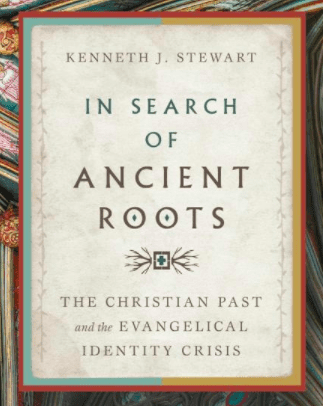 BioLogos has begun a series of posts, Southern Baptist Voices, exploring various objections to evolutionary creation as God’s method of creation. The series features posts by several Southern Baptist scholars and responses by scholars and scientists affiliated with BioLogos who favor the view of evolutionary creation. The comments are closed until all posts in a series are live, and then are closely monitored, censored for tone but not for position.
BioLogos has begun a series of posts, Southern Baptist Voices, exploring various objections to evolutionary creation as God’s method of creation. The series features posts by several Southern Baptist scholars and responses by scholars and scientists affiliated with BioLogos who favor the view of evolutionary creation. The comments are closed until all posts in a series are live, and then are closely monitored, censored for tone but not for position.
The first three conversations are now complete with another four or more anticipated over the next several months. The approach taken in these conversations is one that is much needed and probably far overdue. Whatever your view, I recommend a careful look at all of these posts.
In the first conversation Dr. Kenneth Keathley of Southeastern Baptist Theological Seminary in Wake Forest North Carolina outlined six concerns with evolutionary creation (part I and part II) while Kathryn Applegate, Deborah Haarsma, and Darrel Falk provided a response to these concerns (response I and response II).
The six concerns raised by Dr. Keathley are common concerns. Most of them have come up repeatedly in conversation here. Certainly they are concerns that require response. These concerns are paraphrased as follows:
1. Theological method – it appears that science controls the agenda. Why should theology take second place to science?
2. A faithful interpretation of Genesis has only so much elasticity.
3. Salvation history clearly contains discrete and recognizable acts of God. The incarnation and resurrection are two of the most prominent, but not the only such events. Why should we not anticipate such discontinuities in natural history as well? How and why do we separate one from the other?
4. Adam and Eve – a common concern for sure.
5. The perennial problem of evil.
6. The nature and authority of scripture.
Some of these issues will be the focus of more directed contributions to this series, others are only touched on lightly.
Are there other concerns you would add to Dr. Keathley’s list?
What issues would you like to see us discuss in greater depth?
I am not going to summarize the response given on the BioLogos Forum, although you are welcome to raise any of Dr. Keathley’s concerns, or the response to these concerns, in the comments. Rather I would like to give my thoughts on one of the issues. Perhaps some of the others will be the focus of future posts if there seems to be significant interest. I am, as all here are aware, firmly in the evolutionary creation “camp” if we want to define the conversation in that fashion. As a Christian and a scientist I find no other way forward to be even remotely satisfactory. However, science does not drive my theology, there is no tail wagging the dog (an image used by Dr. Keathley). My theology is driven by the self-revelation of God, and most importantly through his self-revelation in Jesus Christ. Because God is the creator of heaven and earth, things seen and unseen, all science can do is illuminate the nature of God’s creation. But, it does no good as far as I can see, to hold the science captive to any specific interpretations of scripture or theological construct. Whether we find it palatable or not, I believe the appropriate attitude is that God’s self-revelation in the created order, in his interaction with his people recorded in scripture, in the life, death, and resurrection of Jesus Christ, and through the continuing presence of the Holy Spirit, must be consistent. We need a level of humility that allows us to be molded by God through all of his revelation.
In the second conversation in the series Dr. William Dembski asked whether Darwinism is theologically neutral. He lays out four non-negotiables for the Christian faith and four non-negotiables for Darwinism. From his analysis of these non-negotiable elements he concludes that Darwinism is not compatible with Christianity (Part I and Part II). Dr. Falk responded to Dr. Dembski providing his view from the standpoint of evolutionary creation (Part I, Part II). The response is, in fact, one of substantive agreement. In particular there is agreement on all four of the non-negotiables for the Christian faith. The only substantive disagreements lie with connection between evolutionary creation and so-called Darwinism. None of us are “disciples of Darwin.” We are scientists who appreciate the science, but are perfectly willing to disregard the teleological or metaphysical assumptions of Darwin or of anyone else.
One of the biggest disagreements between Dr. Dembski and the position taken by Darrel Falk or, for that matter, by me is in the presence or absence of scientific evidence for the action of God. Here it is interesting to note that God and the Cosmos, a book I have been looking at through a series of posts and will return to next week, is written by two professors at Union University in Jackson Tennessee, a Southern Baptist institution. The discussion Poe and Davis present concerning the action of God in the world provides an interesting contrast to that of Dr. Dembski.
The third conversation in the series was posted just this week. In an essay entitled Teleological Arguments, Theistic Evolution, and Intelligent Design Dr. James Dew raises three issues that he finds concerning. (1) Is macro evolution actually true? While there is evidence that points, perhaps, in this direction it seems far from a done deal to most Christian lay people. Given this and the difficulties inherent in reconciling evolutionary creation with Genesis it simply does not seem reasonable to stake out a position of evolutionary creation, at least not yet. (2) Theistic evolution portrays God’s creative activity in a fashion that borders on deism. Here, once again, there is a significant connection with God and the Cosmos by Poe and Davis. The core of this book centers on God’s action in the world. Deistic views are certainly supported by some, but this is not the only view consistent with modern science or evolutionary creation. (3) Finally, Dr. Dew wonders why theistic evolutionists reject Intelligent Design, but affirm the anthropic principle. This I think is a matter of degree – all Christians accept intelligent design, that is the concept that God designed the world intelligently and with a purpose and end in mind. The disagreement lies in the expectation for evidence of this design. The anthropic principle points to God, but does not prove the existence of God, nor, for that matter the “design” of the world. Much of biology can also point to the creator, but not in a manner capable of proof. The issues are far more complex than those in physics and cosmology.
The response to Dr. Dew is offered by Dr. Ard Louis, a Reader in Theoretical Physics at the University of Oxford whose work borders on the boundary between chemistry, physics, and biology. Dr. Louis has been active in the discussion of the relationship between science and the Christian faith through BioLogos among other things. Part 1 to the response concentrates on the first question – the evidence for macro-evolution. Part 2 concentrates on the second two questions.
In his response to the first question Dr. Louis distinguishes between three facets of evolution at play in our society: Evolution as natural history, Evolution as mechanism, Evolution as worldview. The evidence for evolution as natural history is overwhelming. The progression from simple to complex is clear, and there are transitional forms in the fossil record, with more found all the time. There is no evidence at all for complex life forms at the earliest times, no rabbits in the Cambrian for example. The evidence for evolution as mechanism, genetic mutation, natural selection and more is strong, but involves more speculation and ongoing research. We do not have the complete picture, and there is a growing understanding that the processes are far more complex than originally thought. In contrast the evidence for evolution as worldview is nonexistent.
We need more conversations like this one – with the questions raised and discussed honestly and amicably. I encourage you to take a look at the entire set of posts and responses on the BioLogos Forum. I’ve only given a very brief overview here. It is only a start, however, and a rather limited one at that. The issues are far too big for a blog post, or even a short series of posts. Ard Louis brings up a big part of the problem in his first response to Dr. Dew:
The big question for James Dew and other Southern Baptists who doubt macroevolution, is this: Who should they believe, scientists like myself, or advocates of ID? This problem is not easy to resolve, in part because —as Mark Noll famously pointed out—we evangelicals have not invested nearly enough effort or energy into higher learning. There is no trusted community of scholars to help the church adjudicate on such complex multi-disciplinary questions. We need scholars who have devoted their lives to these topics and who are working at the highest levels in their fields because these issues are difficult to master.
The issues are far too big for a small group with limited expertise and perspective. The task is a job for the church as a whole and requires the gifts of many. Pastors alone, scholars alone, theologians alone, scientists alone will have little impact. There are no fast and easy solutions. As a start to help facilitate this process the BioLogos Foundation, with funding support from The John Templeton Foundation, has announced a grants program, “Evolution and Christian Faith,” for 2012-2015. Awards will range from $30,000 to $300,000 for 34 months with the larger number of awards at the lower end of this range. Preproposals are due in about two weeks, June 15th. Questions about the program can be addressed to BioLogos staff at [email protected].
Are the questions raised by Dr. Dembski or Dr. Dew ones you find significant? If so why?
What are the biggest questions you see confronting the understanding of evolutionary creation?
If you wish to contact me directly, you may do so at rjs4mail[at]att.net.
If interested you can subscribe to a full text feed of my posts at Musings on Science and Theology.














